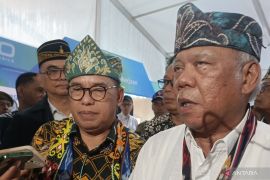Among the places that become the target of the rallies to observe Labor Day or May Day are Hotel Indonesia roundabout, the State Palace and the House of Representatives (DPR) building.
Chief of the KAJS Presidium Surya Tjandra SH LLM said on Sunday the rallies were aimed at pressing the DPR and the government to pass the Social Insurance Management Agency (BPJS) bill into law.
Quoting a statement by KAJS Secretary General Said Iqbal, he said the rallies involving 66 different social organizations were also designed to urge the government to immediately implement Law No. 40 of 2004 on National Social Insurance System by endorsing the bill into law.
"The passage of the bill into law is unbargainable. Without the law the five programs guaranteed by Law No. 40 of 2004 cannot be implemented," he said.
Commenting on rallies held to mark May Day, he said: "We marched to the State Palace where we formed a human chain. Besides the Hotel Indonesia roundabout and the State Palace, KAJS members and sympathizers also held rallies at industrial estates, Soekarno-Hatta airport, Tanjung Priok Port and Jakarta Stock Exchange."
Said Iqbal said the rallies were part of the longstanding struggle of the people who had been living an uncertain life for tens of years in their resource-rich but mismanaged country.
Therefore, he added the passage of the bill into law was imperative as the five-year time span to implement the Law on National Social Insurance System had passed and even entered the seventh year now.
Quoting statements by a number of academicians and lawmakers, Iqbal said a lack of the government`s concern about the law endorsed during the Megawati Soekarnoputri government was betrayal of the constitution and the people`s fate.
Surya Tjandra added that under the Law on National Social Insurance System, all Indonesian people were among others entitled to receive health insurance. "The benefit of the health insurance is that the people deserve to receive optimum, lifetime medical treatment services for all kinds of diseases."
Under the law, civil servants who had so far not been insured against occupational accident deserved to receive occupational accident insurance.
Not only civil servants but also other Indonesians employed in the formal and informal sectors deserved to receive the privileges, he said.
The law also allowed any individual to receive old-age allowance when they reached retirement age.(*)
(S012/H-NG/S012)
Editor: Ruslan Burhani
Copyright © ANTARA 2011











